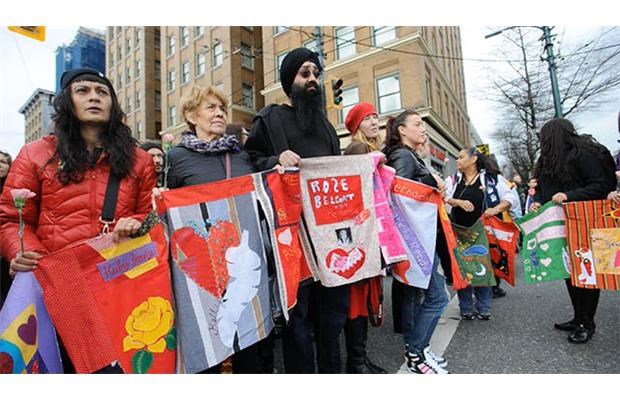North Shore candidates from three of the four major parties are all committing to hold a national inquiry into missing and murdered indigenous women if elected.
The RCMP released a report in 2014 concluding there have been almost 1,200 cases of aboriginal women going missing or being murdered and that, even though they make up only 4.3 per cent of population, they account for 16 per cent of female homicides.
When, during a Vancouver rally last week, New Democrat leader Thomas Mulcair made the promise to call an inquiry within the first 100 days of an NDP government, it drew the loudest, longest applause of the night, said Carleen Thomas, NDP candidate for North Vancouver and a former Tsleil-Waututh Nation council member.
“My favourite line he said was ‘Indigenous lives matter,’” Thomas said. “There are about 1,200 lives that need some closure. They need justice. Their lives were taken violently and the Harper government isn’t taking it seriously enough. It’s like their lives didn’t matter.”
The Liberals first announced their commitment to a national inquiry in August of 2014, said Terry Beech, the party’s Burnaby North-Seymour candidate. “We committed to implemented all 94 recommendations of the Truth and Reconciliation Commission, the national inquiry being the most important one of those 94 conditions,” Beech said. “It’s a pattern that’s gone on for years and years and years and for us to sit by and do nothing is irresponsible. The only way we’re going to get to the bottom of it is to follow up.”
Only the Conservatives, who are represented by Mike Little in Burnaby North-Seymour, argue against the inquiry.
“We’ve said before what a terrible crime it is against the people. I don’t think we need another study on top of some 40 studies that have already been done. We need the police to catch those responsible and ensure that they’re punished,” he said.
Most cases have been solved, and Conservatives have brought forward more than two dozen criminal justice bills, which have stiffened sentences for crimes like murder, sexual assault and kidnapping, most of which have been opposed by the NDP, Little added.
Ken Melamed, Green Party candidate in West Vancouver-Sunshine Coast-Sea to Sky Country, said his party too would support an inquiry.
“We’re on board with the Liberals and the NDP in insisting that the inquiry is long overdue. It’s one of the recommendations from the Truth and Reconciliation Commission. In fact, we support all of the recommendations that came from that,” he said. “It’s part of our commitment to rebuilding a respectful relationship with First Nations across Canada. It’s something their communities have been asking for.”
Sarah Hunt, assistant professor in the First Nations and Indigenous Studies department at UBC, said calls for a national inquiry have been growing over the last 25 years thanks to growing awareness of the Downtown Eastside, the Highway of Tears and Robert Pickton. Though it started with First Nations advocates, it’s now reached the wider community as an election issue, she said.
While different studies have landed on different numbers or ratios of aboriginal women who disappeared or been murdered, the numbers are likely underestimated, Hunt said.
And in any case, there have been too many women to suffer violence, Hunt said.
“The bottom line is that violence against native women has been normalized for a long time and it’s taken many years of advocacy to finally get the public and the police to recognize this is a real problem and we need to do something about it,” she said. “There’s clearly a pattern. We need to do something to better understand those patterns.”
An inquiry, which could be structured in many forms, would get down to the root causes, Hunt said.
“It’s not just the root causes in the lives of indigenous women. It’s also the root causes in society in general. What are the attitudes we need to change? What are the underlying causes for this widespread violence?” she said
More than asking and answering the important questions, an inquiry ought to come with a built-in mechanism to ensure its recommendations are put into action, Hunt said.



